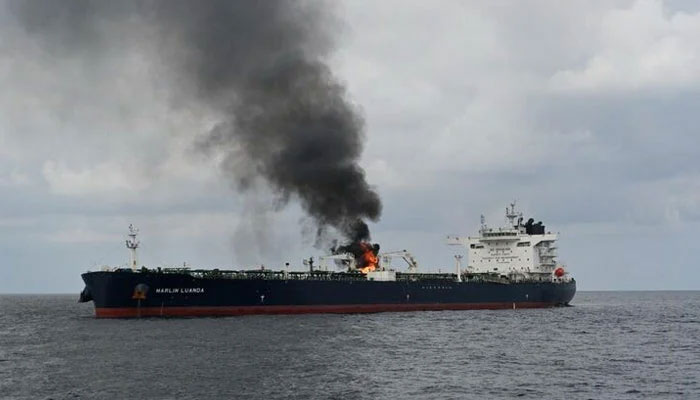Pakistani Crew Rescued After Houthi Drone Attack on LPG Vessel Near Yemen
Pakistan Poised for Regional Maritime Leadership After Houthi Attack Highlights Legal and Security Gaps
ISLAMABAD: In a harrowing maritime incident off the coast of Yemen, the Pakistani crew of the LPG/C Clipper, a Guyanese-flagged LPG carrier, has been safely rescued and repatriated following a drone attack that endangered their lives. The vessel, which has a gross registered tonnage of 2,351, was en route from Djibouti when it was struck by multiple drone attacks near Ras Isa Port between September 17 and 19, 2025. The attacks, suspected to be carried out by Houthi rebels, caused fire and gas leakage onboard, prompting an initial evacuation of the crew to a nearby hotel. However, the crew later alleged they were coerced back onto the vessel by local authorities. The Clipper was anchored approximately 1.1 nautical miles offshore near a suspected Houthi base, raising the risk of an explosion due to ongoing gas leakage and visible smoke.
All 24 crew members, confirmed by the IMO crew list as Pakistani nationals from regions including Swat, Karachi, and Chakwal, were caught in the unfolding crisis. Among them were Captain Mukhtar Akbar and Chief Engineer Syed Fida E Mehdi Zaidi. The crew, facing deteriorating conditions and alleged confiscation of communication devices, issued video appeals pleading for immediate relocation to Djibouti. The situation was further complicated by the fact that the vessel was not under the control of Yemen’s internationally recognized government, making diplomatic intervention challenging.
Read more: Over two dozen Pakistanis trapped after Houthi attack on Yemen-Bound Ship
Efforts to secure the crew’s safety gained traction following a formal advocacy letter from the Research Center for International Maritime Law and Practice (RCIMLP Pakistan) on September 21, 2025. This was followed by a rescue and support offer from Ambrey’s Maritime Security Seychelles on September 26. Yemeni authorities eventually granted port clearance on September 27 through the Salif Port – Ras Isa Port Administration, allowing the vessel to sail toward Djibouti within a 24-hour window beginning at 00:20. This clearance facilitated the safe repatriation of the Pakistani crew despite reports that some danger still persisted at sea.
Pakistan’s Ministry of Foreign Affairs and Ministry of Maritime Affairs played central roles in coordinating efforts between Yemeni authorities, the International Maritime Organization (IMO), and Guyana, with additional support from the Pakistan Navy. The Navy’s collaboration with RCIMLP Pakistan under the MARSEW (Maritime Security & Emergency Welfare) program helped mobilize legal and security resources, while RCIMLP continued to provide legal advocacy and policy recommendations rooted in Pakistan’s Constitution and the Maritime Labour Convention (MLC) regulations.
The involvement of private security firm Ambrey, which offered fire suppression and towage services, was critical given the proximity to high-risk Houthi-controlled areas. While the cost of the intervention is yet to be finalized, the operation emphasized the need for clearer high-risk navigation protocols. Families of the crew members, some of whom had been in distress due to lack of communication, have since expressed deep gratitude to the Government of Pakistan, the Pakistan Navy, and RCIMLP Pakistan for the swift action and safe return of their loved ones. Although no fatalities occurred, counseling was recommended in accordance with MLC Regulation 4.3 on health and safety.
RCIMLP Pakistan, through its legal analysis, has called for an inquiry into the vessel’s operator, Khan Shipping and Trading Company (KSTC), over potential violations of seafarer protection laws and war-zone disclosure obligations. It urged the development of region-specific high-risk navigation guidelines and deeper collaboration with the International Labour Organization (ILO). The Ministry of Maritime Affairs has assigned the Mercantile Marine Department to review crew contracts for war-zone clauses and evaluate the compliance of operators with international safety standards.
The incident occurred amid a wider surge in Houthi attacks linked to regional instability and the ongoing Israel-Gaza conflict, with some speculation suggesting that the Clipper’s Iranian cargo and US-sanctioned status may have made it a target. However, immediate environmental disaster was averted thanks to stabilization efforts. Legal experts believe that Pakistan, having ratified the MLC in 2025, is now positioned to take a leading role in regional maritime welfare and crisis response, with entities like the Pakistan Navy, RCIMLP Pakistan, and relevant ministries actively contributing to legal, diplomatic, and humanitarian outcomes.
Attorney Muslim Bin Aqeel, CEO of RCIMLP Pakistan, emphasized the importance of strengthening international cooperation and ensuring seafarer protections in volatile maritime zones, stating that this incident should serve as a catalyst for enhanced risk assessment, rapid response frameworks, and accountability in the global shipping industry.





Comments are closed, but trackbacks and pingbacks are open.